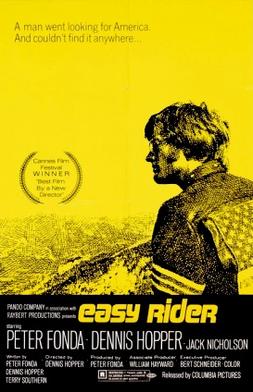
Easy Rider is a 1969 American independent road drama film written by Peter Fonda, Dennis Hopper, and Terry Southern, produced by Fonda, and directed by Hopper. Fonda and Hopper play two bikers who travel through the American Southwest and South, carrying the proceeds from a cocaine deal. The success of Easy Rider helped spark the New Hollywood era of filmmaking during the early 1970s.

A Movie is a 1958 experimental collage film by American artist Bruce Conner. It combines pieces of found footage taken from various sources such as newsreels, soft-core pornography, and B movies, all set to a score featuring Ottorino Respighi's Pines of Rome.
A music video is a video that integrates a song or an album with imagery that is produced for promotional or musical artistic purposes. Modern music videos are primarily made and used as a music marketing device intended to promote the sale of music recordings. These videos are typically shown on music television and on streaming video sites like YouTube, or more rarely shown theatrically. They can be commercially issued on home video, either as video albums or video singles. The format has been described by various terms including "illustrated song", "filmed insert", "promotional (promo) film", "promotional clip", "promotional video", "song video", "song clip", "film clip", "video clip", or simply "video".
Bruce Conner was an American artist who worked with assemblage, film, drawing, sculpture, painting, collage, and photography.

"Ray of Light" is a song by American singer Madonna. It is the title track from her seventh studio album, Ray of Light (1998), and was released as the album's second single on April 27, 1998, by Maverick Records. The song was also included on the compilation albums GHV2 (2001) and Celebration (2009). Written by Madonna, William Orbit, Clive Maldoon, Dave Curtiss, Christine Leach, and produced by Madonna and Orbit, "Ray of Light" is based on Curtiss Maldoon's "Sepheryn" and is an electronic dance song with techno, trance, Eurodance, and disco influences. "Ray of Light" consists of a main synth sound oscillating on the primary musical note and an electric guitar riff. Lyrically, the song has a theme of freedom.
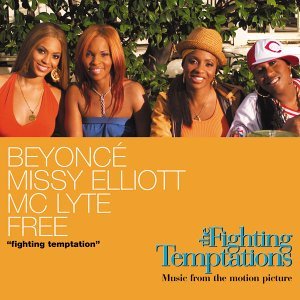
"Fighting Temptation" is a song recorded by American singer Beyoncé and American rappers Missy Elliott, MC Lyte, and Free for the film The Fighting Temptations (2003), starring Beyoncé. It was written by Beyoncé, Elliott, Lana Moorer, Marie Wright, Jonathan Burks, LaShaun Owens, Karriem Mack, and Walter Murphy. An R&B-funk song, "Fighting Temptation" samples Uncle Louie's "I Like Funky Music" (1979). Lyrically, the song makes a reference to fighting against negativity in life as well as waiting for the right person before falling in love. It was released as the lead single from the soundtrack for The Fighting Temptations on August 18, 2003, by Columbia Records.
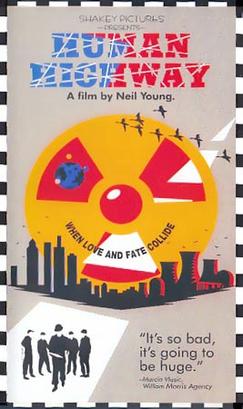
Human Highway is a 1982 American comedy film starring and co-directed by Neil Young in his film and directional debut under his pseudonym Bernard Shakey. Dean Stockwell co-directed the film and acted along with Russ Tamblyn, Dennis Hopper, and the band Devo. Included is a collaborative performance of "Hey Hey, My My " by Devo and Young with Booji Boy singing lead vocals and Young playing lead guitar.

"Eight Easy Steps" is a rock song written by Alanis Morissette for her sixth studio album, So-Called Chaos. The album's opening track, it was released in 2004 as the So-Called Chaos's third single. The song may be seen as discussing self-help, with the message that it is the "course of a lifetime", but the help that is actually "offered" in the song is tongue-in-cheek, with lines like "How to lie to yourself and thereby to everyone else" and "How to control someone to be a carbon copy of you."
In filmmaking, found footage is the use of footage as a found object, appropriated for use in collage films, documentary films, mockumentary films and other works.

The Last Movie is a 1971 metafictional drama film directed by Dennis Hopper, who also stars as a horse wrangler named after the state of Kansas. It is written by Stewart Stern, based on a story by Hopper and Stern, and stars an extensive supporting cast including Stella Garcia, Don Gordon, Peter Fonda, Julie Adams, Sylvia Miles, Samuel Fuller, Dean Stockwell, Russ Tamblyn, Tomas Milian, Toni Basil, Severn Darden, Henry Jaglom, Rod Cameron, Kris Kristofferson and Michelle Phillips. The plot follows a disenfranchised stuntman (Hopper), who begins a filmmaking-centric cargo cult among Peruvian natives after going into self-imposed exile.

"Twilight Zone" is a 1982 hit by Dutch band Golden Earring. It was written by the band's guitarist George Kooymans, who drew inspiration from the spy thriller book The Bourne Identity rather than the 1960s mystery television series The Twilight Zone. The song "Twilight Zone" appears on Golden Earring's 1982 album Cut. It spent 27 weeks on the US Pop charts. It was the group's sole Top 10 Pop single on the US Billboard Hot 100 and hit No. 1 on the Billboard Top Album Tracks chart, the band's only No. 1 hit in America.
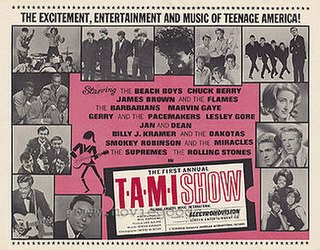
T.A.M.I. Show is a 1964 concert film released by American International Pictures. It includes performances by numerous popular rock and roll and R&B musicians from the United States and England. The concert was held at the Santa Monica Civic Auditorium on October 28 and 29, 1964. Free tickets were distributed to local high school students. The acronym "T.A.M.I." was used inconsistently in the show's publicity to mean both "Teenage Awards Music International" and "Teen Age Music International".

"Lazer Beam" is a single by Super Furry Animals. It was the only single to be released from the Love Kraft album and reached #28 in the UK Singles Chart, and as of 2023, remains their last UK Top 40 hit. The song is "about making your own reality" and tells the story of aliens coming down to earth to shoot humans with laser beams which "make them intelligent rather than being jerks". Some of singer Gruff Rhys's lyrics were lifted from a speech made by Tony Blair at the Labour Party Conference in 2004.

Look Sharp Live is the second concert film by Swedish pop music duo Roxette, released on 2 October 1989 on VHS format by EMI and Picture Music International. The footage consists of two edited concerts filmed on the Borgholm Castle ruin on the Swedish Baltic Sea island of Öland on 25–26 July 1989. The film was directed Doug Freel with a predominantly American production crew, who believed the ruin had been created especially for the film. Gessle later said in the liner notes of Don't Bore Us, Get to the Chorus! Roxette's Greatest Hits (1995): "It took some time to convince them that the place actually was for real."
Cosmic Ray is a 1962 American experimental short film directed by Bruce Conner. With both found footage and original material, it features images of countdown leader, a nude woman dancing, a Mickey Mouse cartoon, and military exercises. It is soundtracked by a performance of Ray Charles's "What'd I Say" and has been recognized by some critics as one of the first music videos.
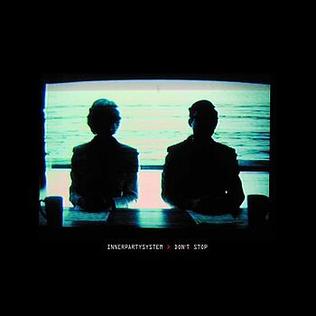
"Don't Stop" is the debut single by the American band Innerpartysystem from the band's self-titled debut album. Before being mastered the song was officially released on the band's debut EP. The single was re-released mainly due to poor endorsement by American music channels.

Antonia Christina Basilotta, better known by her stage name Toni Basil, is an American singer, choreographer, dancer, actress, and director. Her song "Mickey" topped the charts in the US, Canada and Australia and hit the top ten in several other countries.

"Notorious" is a song by British-Irish girl group The Saturdays, released as the lead single from their third studio album, On Your Radar. The song was written by Ina Wroldsen and Steve Mac, who also produced the song. The single was released digitally on 22 May 2011. "Notorious" was recorded in 2011 after the band were looking for a new sound to release in their third album. According to the lyrics in the song the band are loving life, they like to go out and enjoy themselves however they work hard and they all have a bad and naughty side to them. The lyrics of the song has been described as "playful". Vanessa White said the song was a more "grown up" approach to the music they have released before. The group performed the song live for the first time on So You Think You Can Dance and the song received its first radio airplay on The Chris Moyles Show.

"T.W.L/Yellow Pansy Street" is the double-A side single release by the Japanese boyband Kanjani8, the former written and composed by Yujin Kitagawa of Yuzu and the latter written and composed by Takeshi. This release marks their first single release for the year 2011 and their 16th single overall. The single was used as the theme song for the release of the 19th Crayon Shin-chan movie, Crayon Shin-chan: The Storm Called: Operation Golden Spy as well as the 14th theme song for the anime. The single was released by Imperial Records as the first release from their fifth album titled, Fight. As a double single, "T.W.L/Yellow Pansy Street" features two different styles of music, J-pop for T.W.L and rock for Yellow Pansy Street, and uses several different instruments in its overall composition such as horns, guitars, drums, keyboards and synthesizers. The lyrics for "T.W.L" focus on going forward without looking back while the lyrics for "Yellow Pansy Street" are about a man looking back on what could have been with his former lover.

"Wonderful World!!" is a single release by the Japanese boyband Kanjani8. The song was written and composed by ROADIE with music arranged by Yasutaka Kume. It is accompanied by the B-side titled, " Ukiyo Odoribito " which was written and composed by TAKESHI. This single release was the band's first release for 2010 and their 14th single release overall. The single was released by Imperial Records as the second single release for their fourth album, 8 Uppers. The single also served as the introduction to the 8 Uppers story, the movie that also came with the album's release.
















